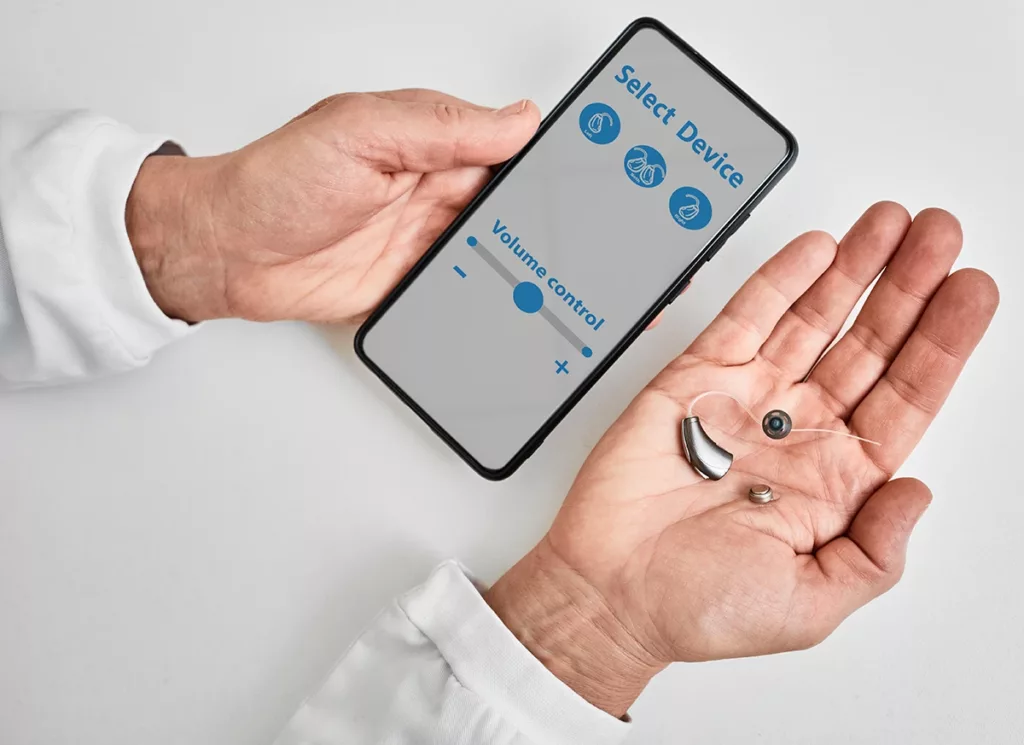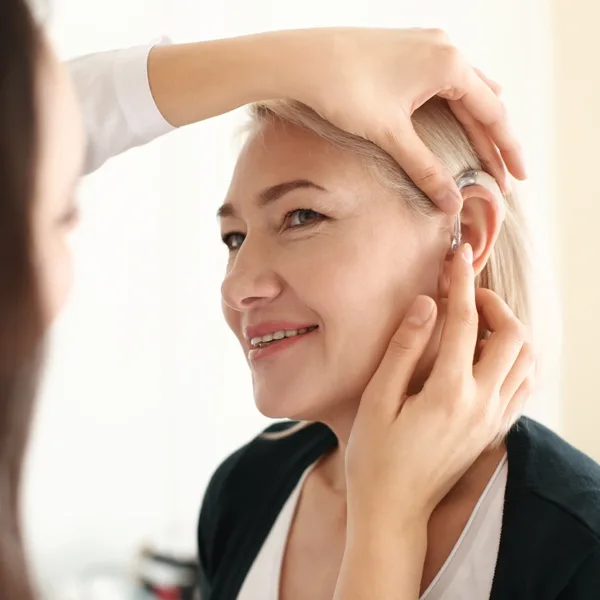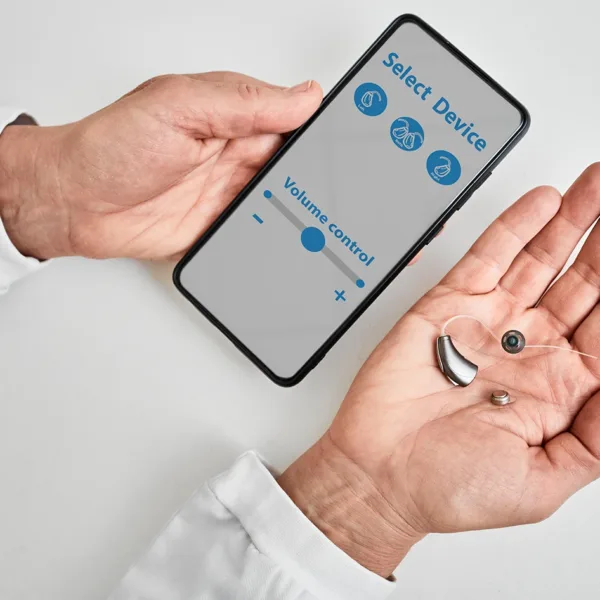
Choosing the right hearing aid is essential for addressing your specific hearing needs and improving your overall quality of life. If you’ve ever wondered how to choose a hearing aid that will work best for your needs, this guide is for you. In this article, we’ll explain the most important things to consider when looking for the best hearing aid for your needs, lifestyle, and budget.
A Comprehensive Guide to Choosing the Right Hearing Aid
Living with hearing loss can present its own set of challenges, but thanks to the remarkable strides in technology, hearing aids have become indispensable tools for millions of people. Modern hearing aid technology can not only restore your ability to fully engage with the world around you, but also elevate your overall quality of life.
While these advancements are life-changing for many, this rapid technology boom can also make choosing the best hearing aid for your needs feel a little overwhelming. Below, we list the most important things to consider when selecting a hearing aid with your hearing care specialist.
Degree of Hearing Loss
The first step in finding the best hearing aids for your needs is determining what degree of hearing loss you have. Hearing loss is classified into various degrees according to its severity, ranging from mild to profound:
- Mild Hearing Loss: Difficulty hearing speech in noisy settings with a lot of background noise.
- Moderate Hearing Loss: In addition to difficulty hearing in background noise, hearing speech in quiet environments may be challenging.
- Severe Hearing Loss: Difficulty hearing most sounds, including speech in quiet environments.
- Profound Hearing Loss: Unable to hear most sounds, including loud speech in all settings.
Your degree of hearing loss significantly influences the hearing aid options that would work best for your needs. Generally, more severe hearing loss requires more powerful hearing aids with advanced amplification capabilities. Conversely, those with mild hearing loss may benefit from less powerful devices.
Understanding the relationship between your degree of hearing loss and the appropriate hearing aid power is crucial. Working closely with your hearing care specialist, you can determine the right hearing aid to effectively address your unique needs.
Hearing Aid Styles

Today’s hearing aids are more discreet and powerful than ever before. However, when it comes to styles of hearing aids, one size does not fit all. Understanding the differences in these styles is crucial in choosing a hearing aid that will best serve your hearing needs as well as your personal preferences. The following compares the two most common categories of hearing aid styles: custom hearing aids and behind-the-ear (BTE) hearing aids.
Custom Hearing Aids
There are a variety of different custom hearing aid styles available, all of which are individually made to fit comfortably within your ear. Custom devices blend seamlessly with your natural ear shape and are often considered a more discreet hearing aid option. Custom hearing aids can be suitable for people with mild to moderate degrees of hearing loss and in some cases severe levels as well.
Behind-The-Ear Hearing Aids (BTE)
As the name suggests, BTE hearing aids sit behind your ear and can also be discreet. They are connected to a custom-made earpiece or a thin tube that directs sound into your ear canal. BTE devices are known for their high amplification capabilities making them suitable for any degree of hearing loss ranging from mild to profound. Due to their larger size (relative to a custom), BTE hearing aids can also include more advanced hearing technology, features, and setting options.
Lifestyle
The ideal hearing aid is one that complements your lifestyle, enhances your daily experiences, and ultimately enriches your quality of life. To find hearing aids that align perfectly with your needs, it’s important to consider your daily activities and the environments you are typically in. Your lifestyle and the specific situations you encounter will influence the features and level of technology your hearing aids will need to provide.
Communication Needs
If you often find it hard to communicate with people, especially in noisy settings or larger groups, you’ll benefit from hearing aids equipped with an adaptive directional microphone. In noisy environments, adaptive microphones mimic the way our ears naturally focus on specific sounds, like someone talking to you, making it much easier to hear them clearly.
Connectivity

Bluetooth-enabled hearing aids are designed to keep up with a modern lifestyle. With Bluetooth technology, your hearing aids can wirelessly connect to all your favorite devices like smartphones, tablets, TVs, and computers. Whether you’re working, relaxing, or just out and about, these devices allow you to effortlessly stream phone calls, music, or other audio directly into your hearing aids.
Hearing Aid Technology
Modern hearing aids come in a large variety of different technological levels, ranging from more basic options to highly advanced. Choosing the appropriate technology ensures your hearing aid can effectively address your specific hearing needs, lifestyle, and preferences.
Battery
Today, most prescription hearing aids are available with the option of disposable or rechargeable batteries, each having advantages depending on your lifestyle and personal preferences.
Ease of Use

User-friendly controls and settings are vital to ensuring you get the most out of your hearing aids. It’s important to consult with your hearing care specialist so they can help you find hearing aids that are easy for you to use, especially if you have any dexterity concerns.
Budget
When looking for your ideal hearing aid, it’s essential to discuss your budget with your hearing care professional. The average price of hearing aids can vary significantly depending on a range of factors including technology levels, features, styles, and more. A comprehensive treatment plan may require more advanced hearing technology, which may incur higher costs, but ensures the most comfortable and personalized hearing solution for you.
The right hearing aids should not only address your specific hearing needs but also suit your budget. Your hearing healthcare specialist can provide valuable guidance in finding the best hearing aids that provide both value and an improved quality of life.
Find the Best Hearing Aids for Your Needs, Lifestyle, and Budget
Don’t let hearing loss hold you back from fully experiencing the world around you. Choosing a hearing aid is a significant decision that can dramatically improve not only your hearing, but also your daily communications, recreational enjoyments, and ultimately your quality of life.
Our hearing healthcare specialists are here to help you find the best hearing aids for your unique hearing needs, your lifestyle, and your budget. Find an Audibel hearing clinic near you today.







Have a question or Comment?